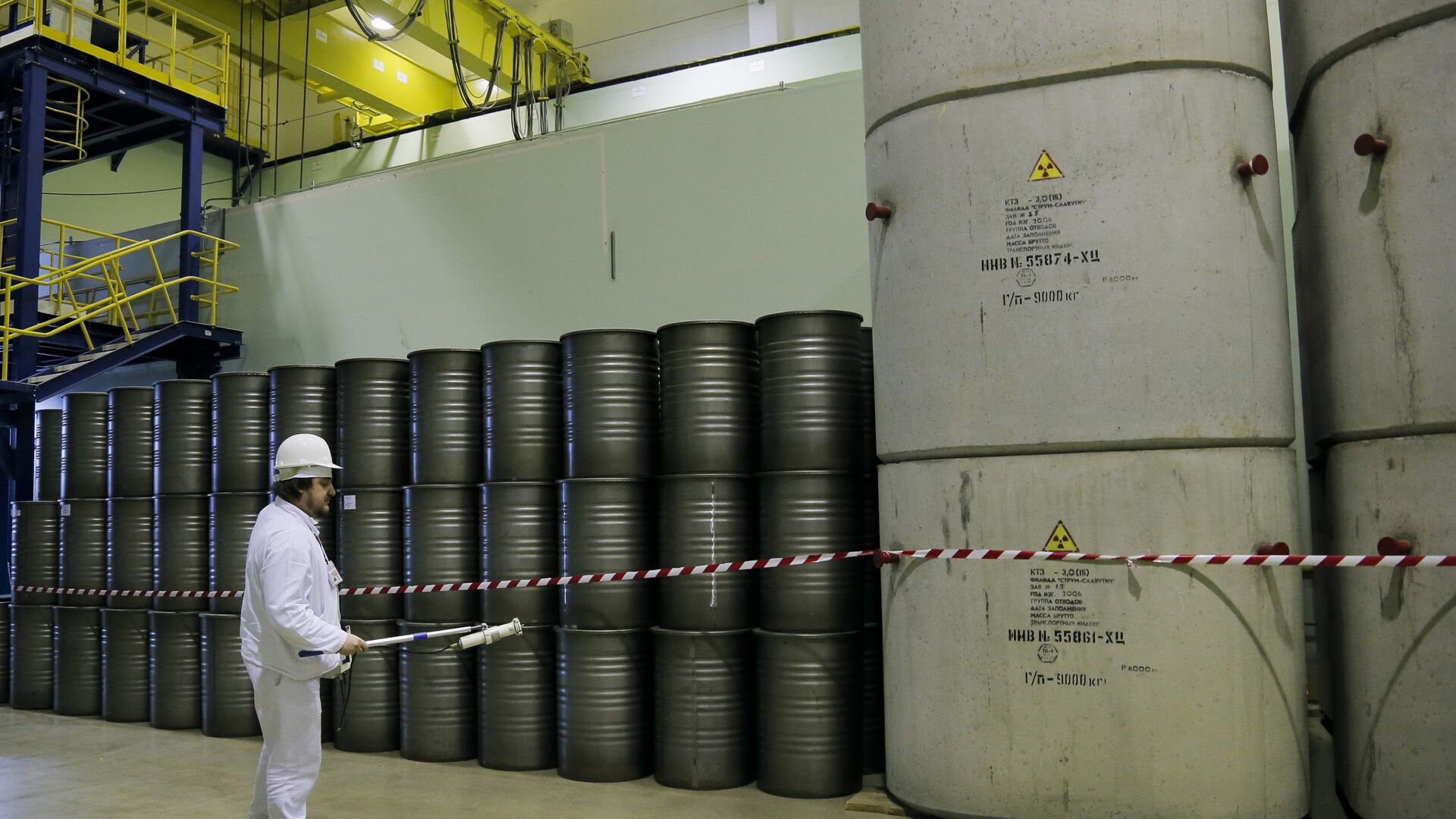https://sputnikglobe.com/20220306/us-could-have-helped-kiev-in-its-work-toward-nuclear-weapon-development-source-says-1093627991.html
US Could Have Helped Kiev in Its Work Toward Nuclear Weapon Development, Source Says
US Could Have Helped Kiev in Its Work Toward Nuclear Weapon Development, Source Says
Sputnik International
MOSCOW (Sputnik) - Kiev has been actively exploring the possibilities of uranium mining and enrichment, and the United States could have possibly supplied... 06.03.2022, Sputnik International
2022-03-06T05:55+0000
2022-03-06T05:55+0000
2022-03-06T05:56+0000
russia's special operation in ukraine
world
ukraine
us
nuclear development
uranium
plutonium
https://cdn1.img.sputnikglobe.com/img/106168/97/1061689754_0:235:4513:2774_1920x0_80_0_0_92b3157af06c883d01b54dd6a257e651.jpg
"...in recent years, Ukraine has stepped up exploration of deep layers in the territory of existing uranium mines, as well as the development of promising uranium deposits, in particular in the Nikolaev, Dnepropetrovsk and Kirovograd regions," the source said.According to the source, Kiev representatives have initiated dialogue with foreign companies on providing assistance to Ukraine in creating its own uranium enrichment enterprises. Ukraine also received plutonium, possibly from the United States, the source said.The Kharkiv Institute of Physics and Technology played a key role in Kiev’s work toward nuclear weapon development, but many other scientific institutions across Ukraine were also involved, such as the Institute for Nuclear Research in Kiev, the source specified.While working on the creation of a nuclear explosive device, Kiev was also actively engaged in potential means of delivery of nuclear weapons, the source told Sputnik explaining that "work was underway in the country to modernize existing and create new missile weapons that can be used as means of delivering nuclear weapons."Kiev created a "cover" for these developments by implementing joint projects with other countries, according to the source. Kiev could have also covertly acquired technology from the West for centrifuge enrichment of uranium and laser isotope separation.Speaking at the Munich Security Conference last month, Ukrainian President Volodymyr Zelensky threatened to revise the country's non-nuclear status, saying he was going to initiate negotiations involving parties to the Budapest Memorandum on Security Assurances.The Budapest Memorandum on Security Assurances comprises three identical political agreements signed at the OSCE conference in Budapest, Hungary, on 5 December 1994 to provide security assurances by its signatories concerning the accession of Belarus, Kazakhstan and Ukraine to the Non-Proliferation of Nuclear Weapons Treaty. The memorandum was originally signed by three nuclear powers: Russia, the UK and the US.
ukraine
Sputnik International
feedback@sputniknews.com
+74956456601
MIA „Rossiya Segodnya“
2022
Sputnik International
feedback@sputniknews.com
+74956456601
MIA „Rossiya Segodnya“
News
en_EN
Sputnik International
feedback@sputniknews.com
+74956456601
MIA „Rossiya Segodnya“
Sputnik International
feedback@sputniknews.com
+74956456601
MIA „Rossiya Segodnya“
ukraine, us, nuclear development, uranium, plutonium
ukraine, us, nuclear development, uranium, plutonium
US Could Have Helped Kiev in Its Work Toward Nuclear Weapon Development, Source Says
05:55 GMT 06.03.2022 (Updated: 05:56 GMT 06.03.2022) MOSCOW (Sputnik) - Kiev has been actively exploring the possibilities of uranium mining and enrichment, and the United States could have possibly supplied Ukraine with plutonium suitable for nuclear weapon development, a Russian source familiar with the industry told Sputnik.
"...in recent years, Ukraine has stepped up exploration of deep layers in the territory of existing uranium mines, as well as the development of promising uranium deposits, in particular in the Nikolaev, Dnepropetrovsk and Kirovograd regions," the source said.
According to the source, Kiev representatives have initiated dialogue with foreign companies on providing assistance to Ukraine in creating its own uranium enrichment enterprises. Ukraine also received plutonium, possibly from the United States, the source said.
"In order to accelerate the research and development work, plutonium of the required quality was obtained from abroad at the initial stage. According to available information, the United States had already transferred this material to its partners. There is reason to believe that there was Washington’s participation in the case of Ukraine," the source told Sputnik.
The Kharkiv Institute of Physics and Technology played a key role in Kiev’s work toward nuclear weapon development, but many other scientific institutions across Ukraine were also involved, such as the Institute for Nuclear Research in Kiev, the source specified.
While working on the creation of a nuclear explosive device, Kiev was also actively engaged in potential means of delivery of nuclear weapons, the source told Sputnik explaining that "work was underway in the country to modernize existing and create new missile weapons that can be used as means of delivering nuclear weapons."
Kiev created a "cover" for these developments by implementing joint projects with other countries, according to the source. Kiev could have also covertly acquired technology from the West for centrifuge enrichment of uranium and laser isotope separation.
Speaking at the Munich Security Conference last month, Ukrainian President Volodymyr Zelensky
threatened to revise the country's non-nuclear status, saying he was going to initiate negotiations involving parties to the Budapest Memorandum on Security Assurances.
"I am initiating consultations under the Budapest Memorandum. The foreign minister was ordered to convene them. If they do not take place again or there are no security guarantees for our country, upon the results, Ukraine will be fully entitled to think that the Budapest Memorandum does not work, and all the package decisions of 1994 will be put into question," Zelensky told the Munich Security Conference.
The Budapest Memorandum on Security Assurances comprises three identical political agreements signed at the OSCE conference in Budapest, Hungary, on 5 December 1994 to provide security assurances by its signatories concerning the accession of Belarus, Kazakhstan and Ukraine to the Non-Proliferation of Nuclear Weapons Treaty. The memorandum was originally signed by three nuclear powers: Russia, the UK and the US.


